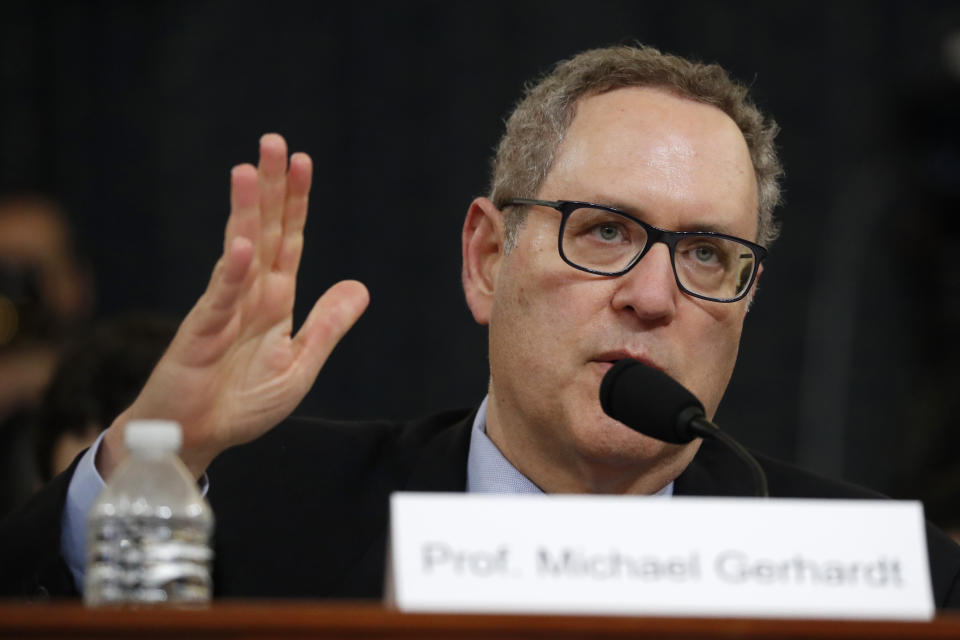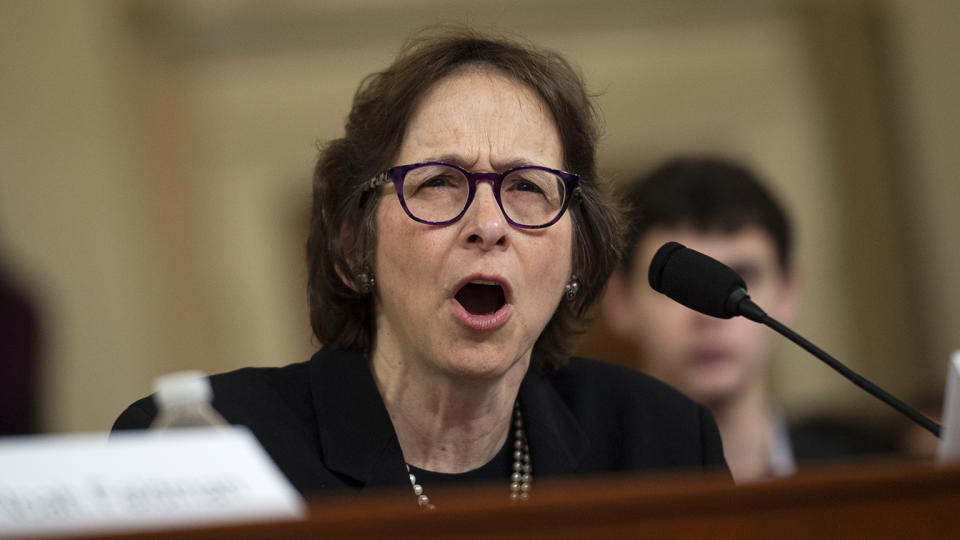Trump impeachment hearings: 4 takeaways from Day 6 of public testimony

The impeachment inquiry into President Trump resumed following the Thanksgiving recess and moved venues to the House Judiciary Committee, chaired by Rep. Jerry Nadler, D-N.Y. Four constitutional lawyers joined the hearing as expert (as distinguished from fact) witnesses, although much of the eight-hour hearing was taken up by monologues by various legislators using their five-minute allotments to maximize their television exposure.
Here are four takeaways from the day’s hearing with legal experts.
“If what we’re talking about is not impeachable, then nothing is impeachable.”

Michael Gerhardt, a law professor at the University of North Carolina, said in his opening statement that the allegations against Trump clearly met the standard for impeachment.
“If what we’re talking about is not impeachable, then nothing is impeachable,” said Gerhardt. “This is precisely the misconduct that the framers created a constitution, including impeachment, to protect against. If there’s no action, if Congress concludes they’re going to give a pass to the president here, as Professor [Pamela] Karlan suggested earlier, every other president will say ‘OK, then I can do the same thing’ and the boundaries will just evaporate. Those boundaries are set up by the Constitution and we may be witnessing, unfortunately, their erosion.”
Noah Feldman, a law professor at Harvard, concurred, stating that while he did not support impeachment after the release of special counsel Robert Mueller’s report in May, which dealt mostly with events related to the 2016 campaign, he changed his mind after seeing the memo describing President Trump’s call to Ukraine President Volodymyr Zelensky.
The majority report from the House Intelligence Committee, which was forwarded to Judiciary Monday afternoon, concluded that Trump had tried to pressure Zelensky to announce investigations that would benefit his 2020 reelection campaign.
“If we cannot impeach a president who uses his power for personal advantage, we no longer live in a democracy,” Feldman said. “We live in a monarchy or a dictatorship.”
Karlan, a professor of law at Stanford University, was the third panelist to say she agreed that Trump’s actions rose to impeachment, a constitutional remedy that the framers provided as a check against presidential overreach. Taking a phrase Trump used in asking Zelensky to “do us a favor,” she noted: “Only kings say ‘us’ when they mean ‘me.’”
“Based on the evidentiary record, what has happened in the case before you is something that I do not think we have ever seen before: a president who has doubled down on violating his oath to ‘faithfully execute’ the laws and to ‘protect and defend the Constitution,’” said Karlan, adding, “Put simply, a candidate for president should resist foreign interference in our elections, not demand it. If we are to keep faith with the Constitution and our republic, President Trump must be held to account.”
All three agreed that Trump had committed high crimes and misdemeanors via three methods: abuse of power, betrayal of the national interest and corruption of elections.
“Close enough is not good enough”

The lone dissenter about the validity of impeachment among the four witnesses was George Washington law professor Jonathan Turley, who was called by Republicans to testify. While Turley was barely addressed during the Democrats’ opening 45 minutes of questioning, Republicans allotted all of their time to him. Turley, who was a witness supportive of impeachment during former President Bill Clinton’s 1998 hearings made the case that the evidence presented by Democrats was “woefully inadequate” to support impeachment, while conceding that Turley conceded that Trump’s call with Zelensky, which the president has aggressively defended, “was anything but perfect.”
“This isn’t improvisational jazz — close enough is not good enough. If you’re going to accuse a president of bribery, you need to make it stick, because you’re trying to remove a duly elected president of the United States,” said Turley, citing a Supreme Court ruling that made prosecuting bribery more difficult.
Responding to Turley’s assessment of the evidence against Trump, Rep. David Cicilline, D-R.I., brought up a Washington Post op-ed by Turley from 2014, when some Republicans were clamoring to impeach President Obama. Turley called the belief that “an impeachable offense must involve a violation of criminal law” was a myth.
“While there’s a high bar for what constitutes grounds for impeachment, an offense does not have to be indictable,” Turley wrote. “Serious misconduct or a violation of public trust is enough. Madison saw impeachment as ‘defending the community against the incapacity, negligence or perfidy of the chief magistrate.’ And the founders emphasized that impeachments were about what happened in the political arena: involving ‘political crimes and misdemeanors’ and resulting in ‘political punishments.’”
Turley, who noted that he had voted for Obama and for Hillary Clinton in 2016, also criticized Democrats for rushing the impeachment process. Some of the witnesses who were closest to the events under discussion, including White House acting chief of staff Mick Mulvaney and former national security adviser John Bolton — have declined, on the advice of the White House, to testify. The Democrats’ strategy is to proceed with impeachment anyway; Turley said the committee should subpoena them and let the courts sort it out, which Democrats say could draw out the process well into 2020. Democrats are hoping for a vote on articles of impeachment in the second half of December, or six to eight weeks after the vote authorizing the inquiry on Oct. 31.
In 1998, when Republicans controlled Congress, the impeachment inquiry into Bill Clinton was approved on Oct. 5 and the House voted for two articles on Dec. 19, two and a half months later.
“I’m insulted by the suggestion”

During his opening statement, Rep. Doug Collins, R-Ga., the committee’s ranking member, accused the four law school professors sitting before him of having attended law school.
“America will see why most people don’t go to law school,” said Collins. “No offense to our professors. But please, really, we’re bringing you in here today to testify on stuff most of you have already written about, all four, for the opinions that we already know out of the classrooms that maybe you’re getting ready for finals in, to discuss things that you probably haven’t had a chance — unless you’re really good on TV of watching the hearings over the last couple of weeks, you couldn’t have possibly actually digested the Adam Schiff report from yesterday or the Republican response in any real way.”
A visibly incensed Karlan rebutted Collins during her opening statement.
“Everything I know about our Constitution and its values and my review of the evidentiary record — and here, Mr. Collins, I would like to say to you, sir, that I read transcripts of every one of the witnesses who appeared in the live hearing because I would not speak about these things without reviewing the facts, so I’m insulted by the suggestion that as law professor I don’t care about those facts,” Karlan said. “But everything I read about those occasions tells me that when President Trump invited, indeed demanded foreign involvement in our upcoming election, he struck at the very heart of what makes this a republic to which we pledge allegiance.”
In describing her preparation for the hearing, Karlan noted that she had spent her Thanksgiving holiday reading the testimony of previous impeachment witnesses.
“I spent all of Thanksgiving vacation sitting there, reading these transcripts. … I ate like a turkey that came to us in the mail that was already cooked because I was spending my time doing this,” Karlan said, to laughter in the room.
Karlan was criticized by the White House and Trump supporters for mentioning the name of the president’s youngest son, Barron, during her testimony.
"The Constitution doesn’t allow titles of nobility," she said. "The president can name his son Barron, but he can’t make him a baron.”
The names of the president’s children are known to the public. Karlan didn’t reference Barron in any other way. Her remark, though, drew condemnation from Rep. Matt Gaetz, R-Fla., and first lady Melania Trump, who tweeted, “A minor child deserves privacy and should be kept out of politics. Pamela Karlan, you should be ashamed of your very angry and obviously biased public pandering, and using a child to do it.”
“Every Democrat in Congress should immediately repudiate Pamela Karlan and call on her to personally apologize to the President and the First Lady for mocking their son on national TV,” Kayleigh McEnany, the Trump 2020 campaign’s national press secretary, said in a statement.
Late in the hearing, Karlan apologized for referencing Barron, saying it was “wrong of her” and that she regretted it but also wished that Trump would apologize for the things he has done that were wrong.
“Move swiftly”

At the beginning of the hearing, Judiciary Chair Jerry Nadler said that the impeachment process would “move swiftly.” This likely means two additional hearings: a formal presentation of the findings from the House Intelligence Committee and a vote on whether or not to recommend articles of impeachment to the full Congress. That in turn would likely mean the full House would vote to impeach Trump the week of Dec. 16, sending the articles over to the Senate for a trial that would begin in early January.
“Are you ready?” asked House Speaker Nancy Pelosi in a closed-door Democratic meeting on Wednesday, according to multiple reports. She did not issue a firm decision or timeline for when votes would occur.
Republicans attempted to drag out the process in the early going, calling for three roll call votes on whether or not to subpoena House Intelligence Chair Adam Schiff, whether or not to subpoena the whistleblower whose report triggered the formal impeachment inquiry and whether or not to delay the hearing to a future date. All the requests were tabled by party line votes.
“This may be a new time, a new place and we may be all scrubbed up and looking pretty for impeachment,” said Collins. “This is not an impeachment. This is simply a railroad job, and today is a waste of time.”
Cover thumbnail photo: Chip Somodevilla/Getty Images
_____
Download the Yahoo News app to customize your experience.
Read more from Yahoo News:
